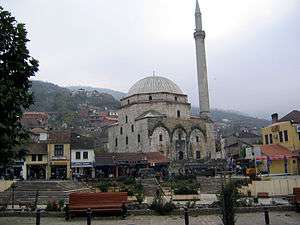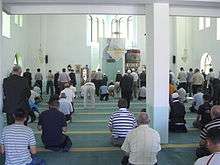Islam in Kosovo
| Part of a series on |
| Kosovo Albanians |
|---|
| Kosovo culture |
|
Art · Cinema · Dress · Literature · Music Sport · Cuisine · Mythology |
| By region or country |
|
Kosovo · Australia · Bulgaria Croatia · Germany Greece · Italy Kosovo · Macedonia Montenegro · Romania Serbia · Sweden Switzerland · Ukraine · United States |
| Varieties of Albanian |
|
Gheg · Tosk · Arvanitika Arbëresh · Cham |
| Religion |
|
Islam in Kosovo Christianity in Kosovo Roman Catholicism Kosovo Protestant Evangelical Church |
| History |
| Origins · History |
Islam in Kosovo has a long-standing tradition dating back to the Ottoman conquest of the Balkans, including Kosovo. Before the Battle of Kosovo in 1389, the entire Balkan region had been Christianized by both the Western and Eastern Roman Empire. From 1389 until 1912, Kosovo was officially governed by the Muslim Ottoman Empire and, as such, a high level of Islamization occurred. During the time period after World War II, Kosovo was ruled by secular socialist authorities in the Socialist Federal Republic of Yugoslavia (SFRY). During that period, Kosovars became increasingly secularized. Today, 96% of Kosovo's population are from Muslim family backgrounds, most of whom are ethnic Albanians.[1] There are also Slavic speaking Muslims, who define themselves as Bosniaks and Gorani, and Turks.
History
Until the sixteenth century the degree of Islamisation in Kosovo was minimal, and largely confined to urban centres. The pace of conversions to Islam only increased significantly in the second half of the sixteenth century, possibly because converts thus became exempt from the cizje, a tax levied only on non-Muslims;[2] the tax burden tended to go up as Ottoman power relative to foreign Christian powers came under challenge. So far as Catholic Albanians were concerned, the Catholic church was less powerful and privileged within the Ottoman Empire than the Serbian Orthodox Church (and less well staffed); the Bektashi order of dervishes carried out a conversion campaign which stressed the similarities between their version of Islam and Christianity (the Bektashis drank wine and had a quasi-Trinitarian doctrine).[3] A phenomenon of "crypto-Catholicism" developed in Kosovo Albanian society, where large numbers of people would convert officially to Islam but follow Catholic rites in private. From 1703 ecclesiastical decrees banned this practice and did not accept that crypto-Catholics could receive holy rites.[4] In 1717, Lady Mary Wortley Montagu, wife of the British Ambassador to the Sublime Porte wrote that her Albanian escort from Belgrade to Istanbul claimed to go to the mosque on Fridays and church on Sundays.[5] Albanians in Kosovo who had been passing as Muslims were declaring themselves Catholics (to avoid conscription) as late as 1845.[6]
The Kosovo War
During the 1999 Kosovo War, 218 out of 540 mosques in Kosovo (nearly 40%) were destroyed by state forces (Federal Republic of Yugoslavia), and many more severely damaged, in addition to destruction caused to secular monuments of Ottoman culture. Some of these attacks (such as the burning down of the Islamic Community of Kosovo center and its archives) took place after the Yugoslav signature of the Kumanovo Agreement which put an end to the hostilities. This led to a wave of revenge attacks on churches by Muslim Albanian extremists in which dozens of churches were damaged. These attacks effectively ended after six weeks at the end of August 1999, after appeals by Kosovo's political leaders and by the Mufti.
Organization
Since Yugoslav times, the official organisation of Muslims in Kosovo has been the Islamic Community of Kosova (Alb: Bashkësia Islame e Kosovës), led by its Grand Mufti, currently Naim Tërnava. Bektashi tekkes are subject to the Bektashi order, and in some areas funding from Saudi Arabia or other countries has led to concern about possible Wahhabist attempts to influence Kosovo and its social habits, although such influences are very rarely visible.
Inter-Faith Relations
There have long been contacts between the Islamic Community of Kosovo and the Catholic Church in Kosovo, and in 2011 regular meetings began at the level of Mufti and Bishops both of the Catholic Church and the Serbian Orthodox Church in Kosovo.
Political Influence
While individual politicians may be influenced in their attitudes or decisions by Islamic beliefs, only one political party - the Justice Party (Alb: Partia e Drejtësisë) includes in its party programme a commitment to traditional Islamic values. It argued in 2010 for Islamic religious teaching in state schools for children from families with a Muslim family background: this was rejected by the Kosovo Assembly. In the parliamentary elections in Kosovo it took part in an electoral coalition led by the AKR (Alliance for a New Kosovo), together with firmly secular parties, presumably because it was unlikely to reach the threshold for parliamentary representation on its own. The AKR coalition itself came in fourth place in the elections with 7.29% of the total vote. (It should be noted, however, that in the 2001 elections the Kosovo Christian Democratic Party, a Kosovo Albanian political entity, won one seat in the Assembly elections; its leadership included people with Muslim names).
Gallery
-

Ottoman mosque, Prizren.
-

An Ottoman mosque in Prizren.
-

Prizren.
-

League of Prizren building in Prizren.
-

Praying at the mosque in Obilić.
See also
- Islamic Community of Kosova
- Islam
- Bosniaks in Kosovo
- Gorani people
- Turks in Kosovo
- Religion in Kosovo
- Christianity in Kosovo
References
![]() This article incorporates public domain material from the Library of Congress Country Studies website http://lcweb2.loc.gov/frd/cs/.
This article incorporates public domain material from the Library of Congress Country Studies website http://lcweb2.loc.gov/frd/cs/.